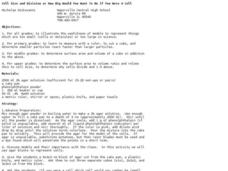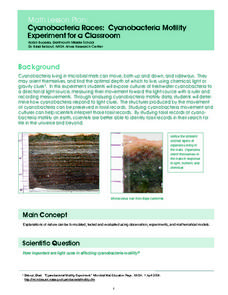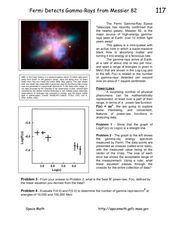Curated OER
Density as a Unique Physical Property
Students find the density of objects by finding their mass and their volume. In this density lesson plan, students determine the mass of objects, the find the volume by using formulas or by water displacement and they calculate the...
Curated OER
Cell Size and Division or How Big Would You Want To Be if You Were a Cell?
Students investigate why cells divide. In this cell size lesson plan, students observe how far a solution travels into 3 different size model cells of agar. They answer questions about the most effect movement of "nutrients" into the...
Curated OER
The Human Organism
Students identify their feelings and learn ways to handle conflict. In this human emotions and conflict lesson, students discuss feelings and ways to handle conflict. Students listen to a story about conflict and determine possible ways...
Curated OER
Exploring Optical Movement in Art
Students describe, represent and analyze patterns and relationships using shapes. They create simple geometric patterns. They demonstrate increasing technical ability and skill to complete visual arts assignments.
Curated OER
Comparing Volumes
Students conduct experiments to discover the various ratios of oil to popcorn kernels. They determine which amount of oil produced the most popped kernels.
Curated OER
Radial Balance Geometric Shapes
Fifth graders create a radially balanced design using geometric shapes which exhibits their prior knowledge of symmetry. They use a kaleidoscope image to develop a design using markers or colored pencils.
Curated OER
Cyanobacteria Races: Cyanobacteria Motility Experiment for a Classroom
Students experiment to determine the effect of light on cyanobacteria movement. They graph the data of the experiment for further analysis. They watch a time-lapse video of cyanobacteria motility at a NASA website.
Curated OER
Perimeter and Circumference
Students consider perimeter and circumference. In this lesson on perimeter, students will determine relationships between perimeter and circumference using real life examples.
Curated OER
The Box Problem
Students create graphic, algebraic and verbal ideas of functions. In this algebra lesson, students graph functions and identify the zeros of the functions. They find the domain and range and classify functions as relation or not.
Alabama Learning Exchange
How Old Is That Tree?
Fifth graders study environmental changes by examining the annual rings of a cross-section of a tree trunk. They access websites to complete a worksheet on the parts of a tree. They count the annual rings on a tree slice while observing...
Utah Education Network (UEN)
If the Shape Fits
Geometers juggle the idea of polygons. Using a game and manipulatives, they make trapezoids and irregular polygons. They review the algorithms for finding the areas of squares and rectangles. On day one, they find the area of trapezoids,...
Curated OER
Earth's Ecology
Students investigate the three states of water. In this physical science lesson, students watch the video "Earth's Ecology" and observe water in its' three states. Students record observations.
Curated OER
How Tall is that Tree?
Students apply their math skills to develop an accurate estimate of the height of a tall tree. Three different methods are outlined. All grade levels should be able to perform the shadow method and the proportional method.
Curated OER
Fermi Detects Gamma-Rays from Messier
For this power law function worksheet, students use data from the Fermi Gamma-Ray Space telescope to apply the power law function to physical phenomena. Students use a graph to solve four problems.
Curated OER
Algebra/Geometry Institute Summer 2009 - Triangles and the Pythagorean Theorem
Seventh graders find the perimeter and area of triangles. In this finding the perimeter and area of triangles lesson, 7th graders find the perimeter and area of triangles given two sides. Students find the missing side by...
Curated OER
In a Giants Garden
Students explore the effect of the earths rotation and its relationship to the suns position and the effect that the longer and shorter amount of daylight has on a pumpkin plant which they have planted.

















